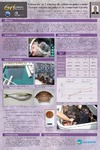Identificador persistente para citar o vincular este elemento:
https://accedacris.ulpgc.es/jspui/handle/10553/6050
| Título: | Evaluación de 2 sistemas de cultivo en pulpo común Octopus vulgaris en jaulas en la comunidad Canaria | Autores/as: | Estefanell, J. Roo, Javier Izquierdo, Marisol Guirao Guijarro, Rafael Socorro Cruz, Juan Antonio Makol, Alex Torrecillas Martín, Ana María Fernandez-Palacios, H. Martin, A. Naranjo, D. Ramírez, B. |
Clasificación UNESCO: | 251092 Acuicultura marina | Palabras clave: | Pulpo Octopus vulgaris Cría y explotación Canarias |
Fecha de publicación: | 2009 | Resumen: | Octopus vulgaris on-growing in floating cages is a promising activity implemented in Spain at industrial level, with productions of 16-32 tons/year from 1998. Nevertheless, some aspects of the culture system need to be evaluated to warrantee its profitability. In the present study two rearing systems and two dietary treatments were evaluated. Individual and group rearing, in PVC net compartments and floating cages respectively, were compared under two dietary treatments. One diet was composed by bogue, supplied as ?discarded? species from local fish farms, and the other was based on a 40-60% discarded bogue-crab Portunus pelagicus. All octopuses were PIT-tagged and the experiment lasted two months. Animals were sampled once throughout the experimental period and absolute growth rate (AGR, g./day) and mortality (%) were calculated. AGR of group rearing was above 30 g./day, however individual rearing showed 100% survival so biomass increment was higher. On the other hand, males grew more than females regardless of dietary treatment. | URI: | https://accedacris.ulpgc.es/handle/10553/6050 | Fuente: | XII Congreso Nacional de Acuicultura, Madrid 24-26, Noviembre 2009 | Derechos: | by-nc-nd |
| Colección: | Póster de congreso |
Visitas 10
37
actualizado el 10-ene-2026
Descargas
6
actualizado el 10-ene-2026
Google ScholarTM
Verifica
Comparte
Exporta metadatos
Los elementos en ULPGC accedaCRIS están protegidos por derechos de autor con todos los derechos reservados, a menos que se indique lo contrario.
